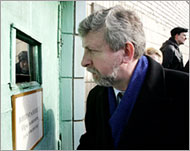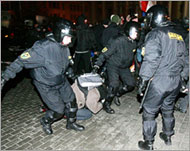Belarus faces Western sanctions
The US has joined European nations in imposing sanctions on Belarus in retaliation for a crackdown on political protesters after an election that the White House said was fraudulent.

Scott McClellan, the White House press secretary, said on Friday Washington would act in unison with the European Union in applying targeted travel restrictions and financial sanctions against Alexander Lukashenko, the Belarus president, and others.
Speaking on behalf of the EU in Brussels, Ursula Plassnik, the Austrian foreign minister, said on Friday the 25 EU leaders had decided to take steps against individuals “politically and administratively” responsible for electoral violations – including Lukashenko.
Plassnik said EU leaders would invoke “restrictive measures”, which would reportedly take effect in April, to express their opposition to the violation of “international electoral standards.”
The decision puts Lukashenko on the same EU blacklist as Zimbabwe’s president, Robert Mugabe, and Myanmar’s military leaders, all of whom have a freeze on their European assets and visa bans against them.
OSCE verdict
On Monday, the Organisation for Security and Cooperation in Europe’s (OSCE) observer mission to Belarus announced that the elections did not meet democratic standards.
“Arbitrary use of state power and widespread detentions showed a disregard for the basic rights of freedom of assembly, association and expression,” the OSCE mission said.
 |
|
Opposition leader Milinkevich has |
Trials began on Friday for several hundred opposition supporters detained in a police raid to shut down a protest tent camp in the centre of Belarus’ capital Minsk, human-rights observers said.
The independent human-rights organisation Viasna, which sent monitors around the city courts, said that as many as 274 sentences were handed out on Friday in courts all over Minsk.
“We have already registered 274 sentences today,” Viasna expert Ales Bilatski told AFP, adding that “this means that at least 300, or maybe 350 people were arrested tonight on the October Square”.
Activists, who were captured in a pre-dawn raid from October Square, where they had been demanding new presidential elections, were accused of taking part in an illegal demonstration, which carries a 10 to 15 day jail term.
But the number of accused and location of all their trials remained hazy because no official information has been issued on how many people were arrested in the pre-dawn raid on October Square. It was also unclear if the other trials would take place over the weekend, when courts are usually shut, or on Monday.
Reporters held
Police in Belarus have arrested 22 reporters since the beginning of this week, an international media watchdog said on Friday in what it called an unprecedented crackdown on journalistic freedom.
 |
|
Riot policemen in Minsk arresting |
“These arrests are intended to gag dissent and to sow a climate of terror in the country. The independent journalists should be immediately released,” the Paris-based Reporters Without Borders (RSF) said in a statement.
RSF said 13 of the journalists were still in prison, mostly serving sentences of several days “for alleged ‘hooliganism’, ‘taking part in an unauthorised gathering’ or for ‘offering obscenities'”.
It said they were held in overcrowded and unheated cells and called for their immediate release.
Russia demurs
Russia, which has backed Lukashenko as a regional ally in the former Soviet bloc, responded on Friday, accusing the OSCE mission of instigating tensions during the election campaign, and of demonstrating bias.
|
|
“Long before the elections, the OSCE mission led by the Office for Democratic Institutions and Human Rights (ODIHR) had declared that (the elections) would be illegitimate and it was pretty biased in its commentaries on their progress and results – let’s be frank – thus playing an instigating role,” Sergey Lavrov, the Russian foreign minister, said, adding that there was no cause to doubt the official results of the election.
Russia and Belarus had signed a union agreement in 1996, which calls for close political, economic and military ties, and eventually a full merger.